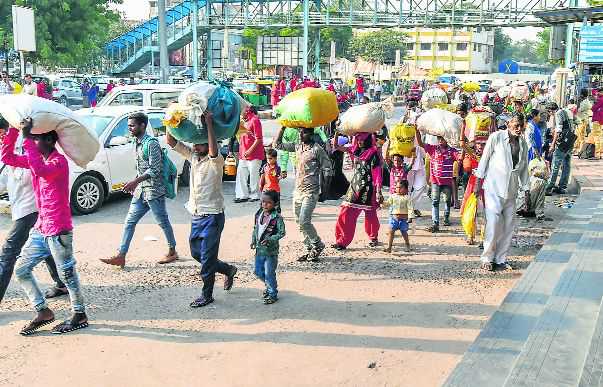
The twist: Migrants, a part of the state’s growth story, are now at the receiving end.
Radhika Ramaseshan
Senior journalist
GUJARAT has led the vanguard of emigration or out-migration from India, before other states such as Punjab, Andhra Pradesh, Kerala and Tamil Nadu followed by example or compulsion. Dwijendra Tripathi, the business historian who chronicled the history of Gujarat’s trade and commercial links established over millennia, quoted a popular adage that if somebody had gone to Java in the years when trade between India and Southeast Asia flourished, be sure he would not return. If he did, he would come back with a bulging purse to see through several generations. Mahatma Gandhi exemplified Gujarat’s spirit of out-migration, when early on in his life, he set sail to South Africa to have a fighting chance at practising law after running out of luck in Mumbai.
Of course, Gandhi was a rare Gujarati who went against the grain of a verse written by poet Ardeshar Khabardar — Jyaan, jyaan vase ek Gujarati, tyaan, tyaan sadakal Gujarat’ (wherever one Gujarati settles, he creates a Gujarat there) — because he was drawn back to India. The state’s history is replete with waves of emigration that were forced upon by economic and professional imperatives or spurred by a yen for adventure. Of the 190 sovereign nations listed by the UN, Gujaratis took up residence in 129 and constitute over 30 per cent of India’s diaspora in the US, UK, Canada, South Africa, Australia and New Zealand.
The saga of emigration had a dark underside that was manifest in the exodus of several thousand Gujarati migrants from Uganda in 1972, when the former military ruler Idi Amin accused them of ‘milking’ his country’s economy. Undeterred by the experience, many of them returned to Uganda later and became a pillar of its economy. In the sixties and early seventies those who sought refuge in Britain to escape repressive regimes in Africa got little respite because they were pushed to the wall by racial assaults, trying economic conditions and the imposition of stringent immigration laws. These circumstances pushed them to emigrate to Canada, the US and Australia, where they worked in sales, insurance and realty before foraying into the hospitality sector and becoming synonymous with America’s motel chains.
The bitter-sweet experience on foreign shores was perhaps among the factors that made India’s Gujaratis remarkably tolerant, if not kind, towards migrants who came to their state, looking for work in the skilled, semi-skilled and unskilled spheres. Among them were the tribals from the districts of Rajasthan, bordering the state, who have been around for several decades. Starting off as daily wagers in the unorganised sector, the Rajasthani migrants earned enough to set up small businesses and become able entrepreneurs. Their place in industry and manufacturing was filled by the migrants from Uttar Pradesh, Bihar and Odisha. Indeed, Surat’s diamond industry is serviced almost entirely by Odisha’s migrants who constitute such a significant vote-bank that Union minister Dharmendra Pradhan, who’s from Odisha, had camped in the city to woo the community during the last Assembly elections.
Gujaratis pride themselves on the fact that the migrants adopted their state as a second abode because it had ‘peace’ and induced a ‘sense of security’ that came with the ban on alcohol. The dream scenario, that was marketed like many other features of the state and acquired a patina of credibility because neighbouring Maharashtra has always had an uneasy equation with its migrants, was shattered in September. A child was raped allegedly by a migrant from Bihar, working in the Sabarkantha district. The episode sparked off a wave of attacks against the ‘Bhaiyyas’ of UP and Bihar, and engendered a ‘we-told-you-so’ sentiment, as if to warn the state government that if the inflow from the north was not stemmed, the lives of Gujarati women and children would be endangered.
Unlike the Rajasthani migrants, now domiciled, who lived in the cities and larger towns, those from UP and Bihar went to small places and villages to take up work in micro units that the locals were unwilling to. Word spread that the migrants, who typically arrived without their families, were a ‘menace’ to the women and should be shunned. So while the first wave of migrants from Rajasthan, who also came single, fairly integrated themselves with the locals, those from North India lived like castaways. The rape exacerbated the hostility towards them.
Congress MLA Alpesh Thakor, who helms a caste outfit called the OBC Ekta Manch, dominated by the Thakore caste he belongs to, spoke out vociferously against the arrest of Thakore youths who allegedly assaulted migrants. His stance lent a caste dimension to the occurrence because he was perceived as filling a political vacuum in the powerful Thakore community that once boasted of leaders such as Shankersinh Vaghela and Bharatsinh Solanki of the Congress. The BJP has not nurtured a Thakore leader.
Alpesh also accused the Vijay Rupani government of short-changing the locals of jobs. Touched to the quick, the CM announced he would bring in a law, mandating manufacturing and service sector entrepreneurs to hire 80 per cent of their workforce from the state. Gujarat’s present policy makes it incumbent on industrial units, benefitting from state incentives, to employ 85 per cent locals but this is not scrupulously followed because the local population is reportedly unwilling to do certain jobs or demands higher wages.
Entrepreneurship has been a way of life with the Gujaratis. The recent agitations, spearheaded first by Hardik Patel who demanded reservation for the Patels in education and jobs, and now Alpesh, demonstrate a churn in the economic dynamics that is bound to impact Gujarat’s politics.



























